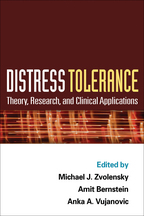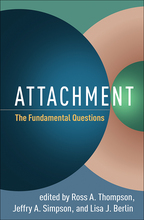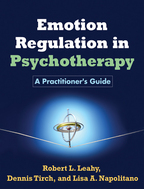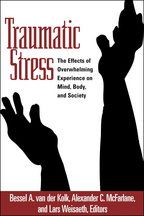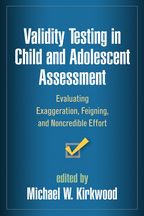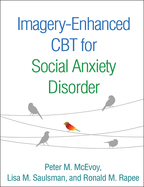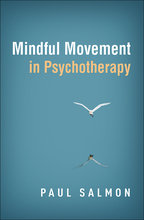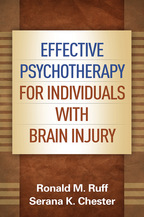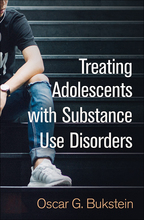Distress Tolerance
Theory, Research, and Clinical Applications
Edited by Michael J. Zvolensky, Amit Bernstein, and Anka A. Vujanovic
Hardcovere-bookprint + e-book
Hardcover
orderNovember 16, 2010
ISBN 9781609180386
Price: $60.00288 Pages
Size: 6" x 9"
“This book is both timely and important....This book represents a thoughtful, well-written review of the literature on distress tolerance and related constructs, including the theories of the role of distress tolerance in psychological disorders and treatment, research testing these theories, and clinical implications of this work....A well-organized, comprehensive review of the current literature on distress tolerance. It will be an invaluable tool for researchers, clinicians, and students interested in the relations of emotional regulation broadly and distress tolerance specifically to psychopathology.”

—Cognitive Behaviour Therapy
“This book offers an excellent opportunity to understand the historical perspectives and understanding of the role of distress tolerance and its relationship to key psychopathological emancipations such as anxiety disorders, traumatic stress, major depressive disorders, substance use disorders, borderline personality disorder, chronic muscular skeletal pain, and related health conditions, as well as eating disorders. Finally, it also offers some interesting clinical and research models for future exploration. I very much enjoyed reading this book and strongly recommend it to educators, clinicians, and investigators”

—The Journal of Nervous and Mental Disease
“With the prominence of distress tolerance in so many problems, including anxiety, traumatic stress, depression, substance use disorders, and personality disorders, this book fills a vacuum in the literature. It brings together new insights regarding the onset and maintenance of psychopathology and presents direct implications for prevention and treatment. The volume contains a wealth of useful information, including measures of distress tolerance, tables summarizing the literature in each area, developmental and theoretical perspectives, biological underpinnings, and applications to specific disorders. Every clinician and clinical researcher would profit from reading this book, and it is a 'must read' for clinicians-in-training. This book will change how you think about the patients you treat—appropriate distress tolerance is at the center of what we do as clinicians.”

—Barbara O. Rothbaum, PhD, ABPP, Director, Trauma and Anxiety Recovery Program, Emory University School of Medicine
“The first volume of its kind. The contributors are experts in their respective areas who provide valuable information on the nature and clinical relevance of distress tolerance. Illuminating the broad impact that distress tolerance and its associated features have on the development, maintenance, and treatment of psychological disorders, this text would be a welcome addition to the reading list of an advanced psychopathology course.”

—Shireen L. Rizvi, PhD, Graduate School of Applied and Professional Psychology, Rutgers, The State University of New Jersey
“Given the growing interest in and widespread applicability of distress tolerance, the field has desperately needed a book like this one. A major strength of this book is its careful, theoretically coherent approach to defining the construct under discussion. Chapters address what distress tolerance is, what it is not, and how it relates to similar constructs, along with implications for assessment and treatment of a variety of clinical problems. The editors do an excellent job of synthesizing all of this material and highlighting innovative directions for future research and treatment. This book would greatly enhance graduate-level courses in psychological intervention. It is essential reading for clinicians who want to approach emotions, distress, and distress tolerance with their clients in a theoretically and empirically grounded manner, as well as for researchers.”

—Alexander L. Chapman, PhD, Department of Psychology, Simon Fraser University, Canada
“This important volume cogently describes the role of distress tolerance in psychological adaptation. It shows how learning to tolerate the distress associated with emotional learning is a hallmark of most empirically validated treatments. The editors and authors make a compelling case for this construct's pivotal role in psychopathology and in treatment research.”

—Zindel V. Segal, PhD, Cameron Wilson Chair in Depression Studies, University of Toronto, Canada
—Cognitive Behaviour Therapy
“This book offers an excellent opportunity to understand the historical perspectives and understanding of the role of distress tolerance and its relationship to key psychopathological emancipations such as anxiety disorders, traumatic stress, major depressive disorders, substance use disorders, borderline personality disorder, chronic muscular skeletal pain, and related health conditions, as well as eating disorders. Finally, it also offers some interesting clinical and research models for future exploration. I very much enjoyed reading this book and strongly recommend it to educators, clinicians, and investigators”
—The Journal of Nervous and Mental Disease
“With the prominence of distress tolerance in so many problems, including anxiety, traumatic stress, depression, substance use disorders, and personality disorders, this book fills a vacuum in the literature. It brings together new insights regarding the onset and maintenance of psychopathology and presents direct implications for prevention and treatment. The volume contains a wealth of useful information, including measures of distress tolerance, tables summarizing the literature in each area, developmental and theoretical perspectives, biological underpinnings, and applications to specific disorders. Every clinician and clinical researcher would profit from reading this book, and it is a 'must read' for clinicians-in-training. This book will change how you think about the patients you treat—appropriate distress tolerance is at the center of what we do as clinicians.”
—Barbara O. Rothbaum, PhD, ABPP, Director, Trauma and Anxiety Recovery Program, Emory University School of Medicine
“The first volume of its kind. The contributors are experts in their respective areas who provide valuable information on the nature and clinical relevance of distress tolerance. Illuminating the broad impact that distress tolerance and its associated features have on the development, maintenance, and treatment of psychological disorders, this text would be a welcome addition to the reading list of an advanced psychopathology course.”
—Shireen L. Rizvi, PhD, Graduate School of Applied and Professional Psychology, Rutgers, The State University of New Jersey
“Given the growing interest in and widespread applicability of distress tolerance, the field has desperately needed a book like this one. A major strength of this book is its careful, theoretically coherent approach to defining the construct under discussion. Chapters address what distress tolerance is, what it is not, and how it relates to similar constructs, along with implications for assessment and treatment of a variety of clinical problems. The editors do an excellent job of synthesizing all of this material and highlighting innovative directions for future research and treatment. This book would greatly enhance graduate-level courses in psychological intervention. It is essential reading for clinicians who want to approach emotions, distress, and distress tolerance with their clients in a theoretically and empirically grounded manner, as well as for researchers.”
—Alexander L. Chapman, PhD, Department of Psychology, Simon Fraser University, Canada
“This important volume cogently describes the role of distress tolerance in psychological adaptation. It shows how learning to tolerate the distress associated with emotional learning is a hallmark of most empirically validated treatments. The editors and authors make a compelling case for this construct's pivotal role in psychopathology and in treatment research.”
—Zindel V. Segal, PhD, Cameron Wilson Chair in Depression Studies, University of Toronto, Canada

